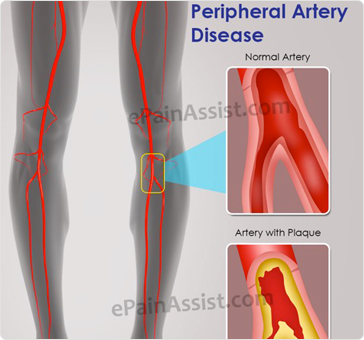Peripheral Arterial Disease

Peripheral artery disease (PAD) occurs when plaque builds up in the arteries that carry blood to your kidneys, intestines, arms, legs, or feet. Plaque is a substance that is made up of calcium, fat, cholesterol, loose fibrous tissue, and other material within the blood. When plaque builds up within these arteries, this can result in pain and numbness. Smoking is the highest risk factor for peripheral artery disease.
Symptoms include:
- Leg numbness/weakness
- Painful cramping (hip, thigh, and calf muscles after exertion)
- Color change in your leg
- Hair loss
- Sores that don’t heal on your feet, toes, and/or legs
If you smoke and you experience pain in any of your limbs, or any of the above symptoms, contact Dr. Shawn Howell at Capital Cardiovascular Specialists and find out if you should be tested for PAD.
Diagnosis and Treatment for Peripheral Arterial Disease (PAD)
After a thorough physical examination, Dr. Howell will check the pulse and blood pressure in your arms and legs using an ankle-brachial index (ABI). Normally, ankle pressure is at least 90 percent of the arm pressure, but if any of the arteries are clogged or blocked, it may be less than 50 percent.
If the ratio between the blood pressure of the ankle and arm is abnormal, Dr. Howell may recommend additional tests, such as Doppler ultrasound imaging, CT angiography, magnetic resonance angiography (MRA), or angiography.
There are three main types of treatment for PAD: lifestyle changes, medication, or surgery.
One of the easiest ways to improve your lifestyle is by eating heart healthy foods and reducing the amount of saturated fats, sodium, red meat, and alcohol you consume. Exercise is another way to change your lifestyle. By adding physical activity to your life, you can significantly improve your PAD symptoms. If you’re a smoker, you should stop; smokers may develop PAD 10 years earlier than nonsmokers.
Dr. Howell may prescribe medications to lower your blood pressure and/or cholesterol. If lifestyle changes and medication are too conservative, she may recommend an interventional procedure such as angioplasty or stent. If you have severe symptoms of PAD or blocked arteries, you may require surgery.
If you’ve been diagnosed with peripheral artery disease, you need a skilled and experienced cardiologist. Board-certified arterial disease specialist Dr. Shawn Howell at Capital Cardiovascular Specialists offers compassionate, expert care.
For an appointment, call (202) 466-3000 or use our online form to request an appointment at one of our convenient locations in Clinton, MD or Washington, DC.